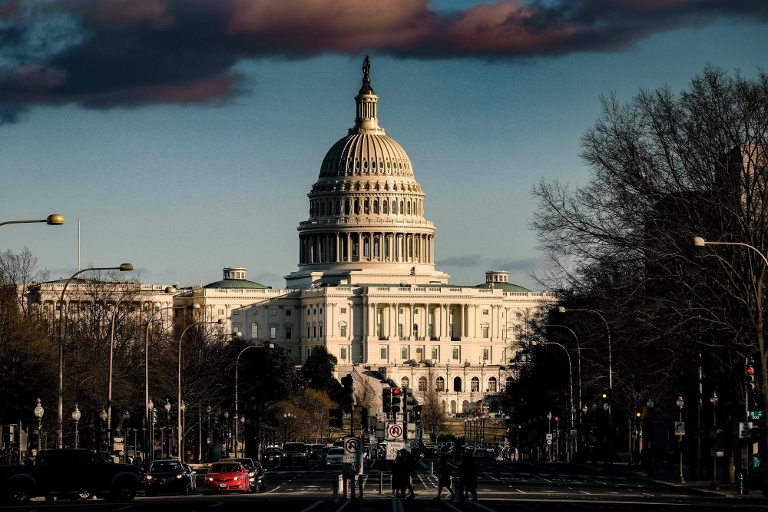The House is returning from its District work period and will reconvene on Tuesday, February 25th.
The Senate is scheduled to reconvene on February 24th.
It will cost more later. According to a report by the consulting firm Oliver Wyman, the financial services sector stands to lose up to $1 trillion if it does not react to climate change quickly enough and is forced to adhere to policy levers like a carbon tax. The group found that if taxes of $50 per metric ton of carbon were imposed across both the power generation and oil and gas industries, credit losses could amount to anywhere from $50 billion to $300 billion. (Reuters)
Because the feds won’t. Takoma Park, Md., is considering implementing the nation’s first total ban on fossil fuels, as part of a local government effort to address a perceived lack of federal action on climate change. The nonbinding proposal would ban all gas appliances, close fossil fuel pipelines, and relocate gas stations outside city limits by 2045 and cost the average homeowner up to $25,000. (The Washington Post)
3 for 3. Recent polling in Nevada by the League of Conservation Voters finds climate change second only to healthcare among Democratic caucus-goers’ priority issues, mirroring a trend in the first two voting states. For Latino voters in Nevada, climate change is the number one issue, the LCV polling found.
It’s fair to state that one reason climate change is on the minds of Latino voters is because of what it is doing to South and Central America.
A significant cause of migration is lost farmlands because of Earth’s warming.
Say what? The conservative group Club for Growth is crafting a plan to address climate change after denouncing a climate agenda introduced last week by House Republican leaders.
Joe Kildea, a Club for Growth spokesman, confirmed to the Washington Examiner that the group is preparing a plan “based on free-market principles, deregulation, etc. — not subsidies, tax breaks, etc.” He did not provide a timeline for releasing the plan.
The reference to opposing subsidies and tax breaks is a jab at a legislative package introduced last week by House Republican leader Kevin McCarthy and allies focused on providing tax subsidies for coal and natural gas plants that capture carbon emissions and launching a program to help the world plant 1 trillion trees.
The package includes an expansion of a tax break approved by Congress in 2018 and signed by President Trump for companies that use carbon capture technology to trap carbon emissions from fossil fuel or industrial plants. Trump has also endorsed planting trees. (Washington Examiner)
If true, this is an extraordinary occurrence. There’s doubt about the Club’s intentions among Republicans.
Talk about living in an alternative universe, David McIntosh, president of the Club for Growth’s PAC, denounced the House Republican agenda vowing that the group would not endorse candidates who support the “liberal environmental policies” push by McCarthy.
As a personal aside, I would have loved to have seen McCarthy’s face when he read he was being accused of pushing liberal environmental policies and having produced a Green New Deal lite.
A tip of the lip? Agriculture Secretary Sonny Perdue walked back an apparent endorsement of the federal government putting a price on carbon emissions, which would have been a break with the rest of the Trump administration.
The confusion came after Perdue said in a briefing that “legitimate, measurable carbon trading” could spur carbon sequestration by giving farmers an incentive to innovate, according to the Financial Times.
“If it is a social goal and social priority there, then let’s put a price over carbon emissions,” Perdue said. “And I think you can really see farmers show out in their carbon sequestration efforts.”
After the story got attention, an Agriculture Department spokesperson clarified that Perdue did not mean to endorse a carbon tax or other pricing mechanism imposed by the federal government. (Washington Examiner)
Members of the Trump administration have lost their jobs for saying things like this.
Talk about alternate universes. President Trump is giving himself and Senate Majority Leader Mitch McConnell high marks for helping bring back the U.S. coal industry.
“Mitch and I have made great progress,” Trump said in a tweet Friday, linking to comments from McConnell that he and the Trump administration have “ended Obama’s regulatory War on Coal” and are “doing all we can to repair the damage.” (Washington Examiner)
Fact check: In 2019, coal-fired power fell 18 percent, putting U.S. coal generation at its lowest levels since 1975, according to research released last month by the Rhodium Group. And the Energy Information Administration’s latest Annual Energy Outlook, even under the reference case, projects nearly 90 gigawatts of additional coal-fired power will retire by 2030.
Warm enough for you? According to scientists from the National Oceanic and Atmospheric Administration, 2020 is already “virtually certain” to be among the ten warmest years on record. Last month was the warmest January in 141 years of record-keeping, said climatologist Karin Gleason, with global average temperatures 2.05 degrees Fahrenheit above average. (The New York Times)
No money, no drilling. A group of 33 House Democrats has sent a letter urging the chief executives of JPMorgan Chase & Co., Wells Fargo & Co., Citigroup Inc., Bank of America Corp. and Morgan Stanley to avoid funding oil drilling and development in the Arctic National Wildlife Refuge. The letter follows a similar push by Senate Democrats and comes in light of an announcement from Goldman Sachs Group Inc. that it would prohibit financing for new drilling or oil exploration across the Arctic, which includes the ANWR. (The Hill)
This is not good. Research published in the journal Nature indicates that methane emissions from fossil fuels are likely 25 to 40 percent higher than previously estimated after researchers found that natural methane levels in Greenland’s ice cores were lower than global estimates. Daniel J. Jacob, professor of atmospheric chemistry and environmental engineering at Harvard University, said the findings are significant but he also noted that while methane emissions from geological causes “were widely considered too high,” fossil fuel methane emissions are calculated using production rates, the number of facilities and direct measurements and that “the natural geological source is irrelevant for these estimates.” (The New York Times)
The past is the past. The EPA won’t retroactively apply revised guidelines on Clean Air Act permits for upgrades and expansion where federal and state permit writers already have issued New Source Review decisions, the agency said in a letter. (Bloomberg Environment)
The ethical need not apply. At least two federal judges appeared skeptical of the EPA’s argument that federal ethics rules don’t apply to the agency’s decisions about who serves on its powerful advisory boards.
During oral arguments in Washington, public health groups and scientists took aim at the Environmental Protection Agency’s 2017 directive that bars anyone receiving EPA grant money from serving as advisers. (Bloomberg Environment)
At long last. Companies seeking tax credits in return for using technology to capture carbon dioxide now have two sure routes to knowing when the IRS thinks their projects actually started—and when they qualify for the tax benefit.
Investors spent two years waiting for Wednesday’s guidance, which was needed after lawmakers expanded the credit for carbon capture and sequestration under tax code Section 45Q. Some projects stalled during that time.
Time is of the essence: Construction on the projects must start before 2024 to qualify for the credit, and the expansion is effective for tax years that start during the 2018 calendar year.
The guidance touched on two of the industry’s top priorities, but left thornier issues for future regulations—such as which uses of sequestered carbon are eligible, said Hunter Johnston, a partner at Steptoe & Johnson LLP, who lobbied Congress on the credit on behalf of Peabody Energy and Lake Charles Methanol as recently as the fourth quarter of last year. Johnson said he expects more guidance within the next month. (Yahoo Finance)
Where does he get this stuff? Trump mocked Gov. Gavin Newsom and state officials for fighting his administration on auto emissions rules and high-speed rail. Trump said a car made under his rules “would be safer because it would not be made out of papier-mache.” (Politico)
The Trump administration has billed its mileage standards as safer and less costly to motorists, but there’s a growing chorus of critics disputing that, including the Trump EPA’s own scientific advisory board.
It’s findings by credible scientists that disagree with the administration that prompts them to want to limit their participation on advisory committees.
Go, Al! Environmental activist and former Vice President Al Gore kicked off a national voter registration campaign alongside the Climate Reality Action Fund to push young voters to prioritize climate in the 2020 elections. (The Hill)
On tap for the week of February 23. Senate Energy Chairman Lisa Murkowski addressed the Alaska Legislature and told state lawmakers her bipartisan energy legislation would land the week of February 23rd. “When I get back to Washington, D.C., I intend to introduce a strong bipartisan bill to advance a range of clean energy technologies, from renewables to energy storage,” she said. “This is probably the single best step that we can take in this Congress to keep energy affordable, strengthen our long-term energy security and reduce our greenhouse gas emissions.”
She assured the lawmakers that fossil fuels would be around for quite a while.
Lead photo: https://unsplash.com/@elevenphotographs






